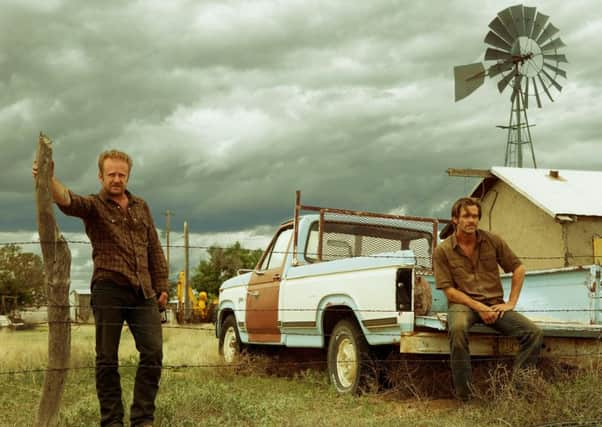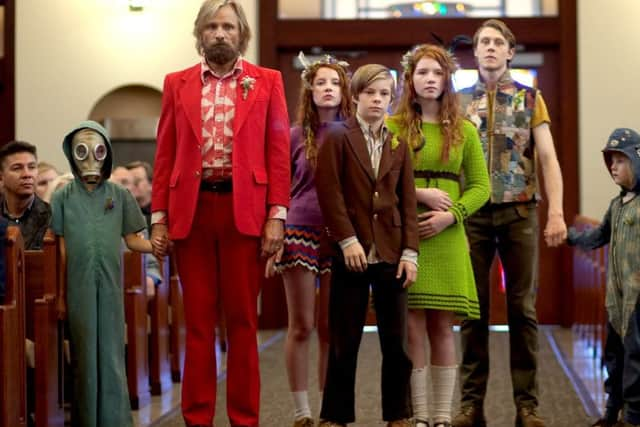Film reviews: Hell or High Water | Captain Fantastic | Anthropoid


Hell or High Water (15) | Rating: ****
Captain Fantastic (15) | Rating: **
Kubo and the Two Strings (PG) | Rating: ****


Anthropoid (15) | Rating: **
Having recalibrated his career with the blistering Starred Up, Scottish director David Mackenzie steps up to the big league with Hell or High Water, a muscular Texan crime thriller that proves far more satisfying than his last attempt to make an American movie: 2009’s disappointing Spread. Furnished with a script by Sicario writer Taylor Sheridan and a cast top-lined by Jeff Bridges, he acquits himself brilliantly, delivering a character-driven, contemporary riff on the western.
Bridges plays an about-to-retire Texan sheriff focused on solving a spate of bank robberies being perpetrated by a grizzled Chris Pine (doing his best work outside of Star Trek) and the always-excellent Ben Foster. They’re a pair of down-on-their-luck brothers – the former a divorced father of two, the latter a volatile ex-con – who are facing a foreclosure notice on their recently deceased mother’s farm. Pine, in particular, is desperate to save the farm so he can provide for his family for the rest of their days, and the extent of that desperation is signalled in the film’s hi-octane opening, with Mackenzie staging two robberies in quick succession. That they’re targeting the branches of a local bank that’s been unsympathetic not only to their family’s needs, but those of the dying communities they’re supposed to serve, gives Pine’s plan a pleasing air of sticking it to the man. But the full scope of the plan is only revealed gradually, with the script drip-feeding details that add weight to the swiftly established narrative momentum.
Advertisement
Hide AdThough this is a thriller with a conscience, it doesn’t fall back on black-and-white morality to get us on the side of its outlaw protagonists. Bridges’ lumbering, mumbling lawman (up there with his turn in True Grit) has a very fixed idea of right and wrong and understands that all actions – even if well intentioned or philosophically just – have damaging consequences, something the film never lets us forget as the bloodshed inevitably intensifies.


There’s a strong sense of place here too. Even in modern-day Texas, the traditions of the western – from dispensing frontier justice to rounding up a posse – never die; they just simmer beneath the surface, ready to erupt at a moment’s notice, perhaps because – as Pine’s character demonstrates – playing by the rules doesn’t get you very far when the whole system is rigged.
Captain Fantastic is also about people railing against societal conventions – albeit in a frustratingly po-faced and relentlessly quirky way that stretches credulity to breaking point. Viggo Mortensen takes the lead as the father of a large brood of home-schooled iconoclasts who live in the woods in the Pacific Northwest and spend their days participating in wilderness survival training and reading leftfield thinkers like Marx and Noam Chomsky. TV, movies, videogames … basically consumerism of any kind is verboten; instead their father is raising them to be free thinkers – albeit free thinkers discouraged from participating in the world as it really operates. That’s a premise with a lot of potential to explore the limits of such parental demagoguery, but writer/director Matt Ross seems more intent on delivering a movie in the spirit of Little Miss Sunshine: wacky dysfunctional family embarks on road-trip, sanitised kookiness ensues. In this case, the suicide of the kids’ bipolar mother is the catalyst for Mortensen to drive his family cross country to attend the funeral – ignoring the objections of her grieving parents, who threaten to have him arrested if he shows up. What follows has moments of sweetness and a couple of interesting exchanges that skirt around some of the darker edges of the set-up, but in the end there’s not enough depth to buy into the premise or its Hollywood ending.
Save for Zootropolis, this year’s crop of animated family films hasn’t exactly been inspiring. Mercifully, Kubo and the Two Strings offers a bit of a corrective. The latest outing from Laika, the stop-motion animation studio behind Coraline, it’s a Japanese-inspired folktale, beautifully told, and infused with dread, death and demons – everything, in short, that makes a good kids’ film. It’s also pretty enchanting and entertaining too, so don’t be put off by the fact that its eponymous hero is a one-eyed boy (voiced by Art Parkinson) who embarks on a quest to find his missing father’s mythical armour after his vindictive grandfather attempts to destroy his mother and kill him. Accompanied by an over-protective monkey (Charlize Theron) and a former samurai turned man-sized beetle (Matthew McConaughey), Kubo’s adventure takes in spectacular battles and lots of intergenerational (and interspecies) banter, all of it done in the service of a story that builds towards a surprisingly complex and moving ending. The tactile animation is gorgeous too, but what’s also great is the willingness to let the story breathe, something that owes more to Studio Ghibli than Pixar.
Anthropoid sounds like a great name for a sci-fi film, but it’s actually the name of a military operation, carried out in the former Czechoslovakia in 1942, to assassinate Reinhard Heydrich, otherwise know as the author of Hitler’s Final Solution. The film – the first of two coming to cinemas – follows two Czech soldiers (played by Cillian Murphy and Jamie Dornan) parachuted into Prague from London to carry out the assassination with the help of the Czech resistance. It’s a remarkable story, but director Sean Ellis doesn’t really do it justice, resorting to lots of shaky cam cinematography to convey the chaos of the times and saddling his actors with Euro-pudding accents and clunky dialogue.